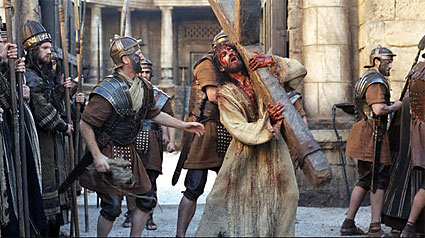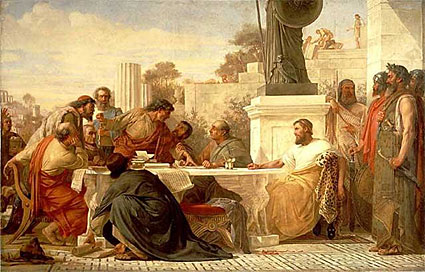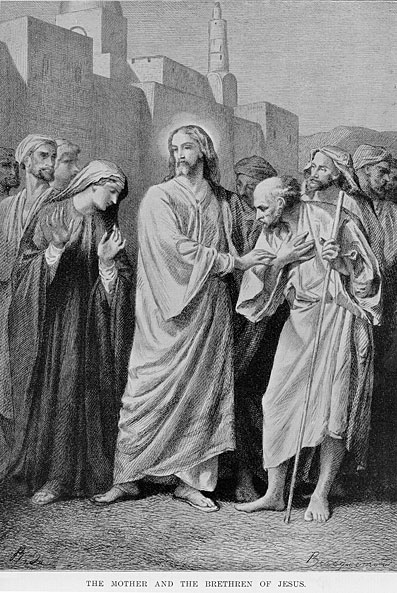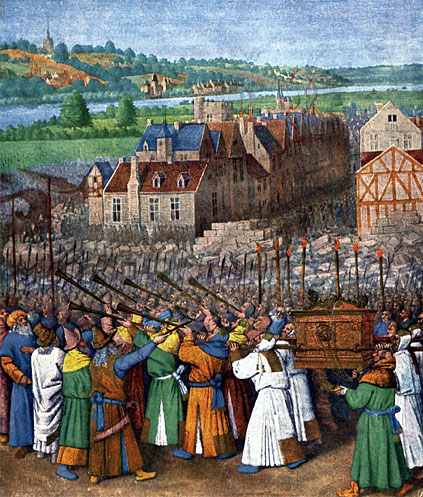Jan
11
2010

Some well-grounded thoughts from Doug Wilson and then some wacko comments from me:
And There Slain
When envy has you by the throat, what can you do? It might appear to you in virulent forms, or it might seem almost invisible—camouflaged nicely to fit in with what you have come to call the principle of the thing. Envy is one of the hardest sins to admit, and it is one of the most widespread. So if you struggle with it, or you think you might be struggling with it, what do you do?
Continue reading
Comments Off | tags: Crucifixion, Doug Wilson | posted in Christian Life, Quotes
Jan
9
2010
A Doug Wilson quote from the recent Auburn Avenue Pastors’ Conference:
“The Apostles’ Creed, the Nicene Creed, are statements of faith that separate Christian from non-Christian. Did you see good old [anti-theist] Christopher Hitchens witnessing to that lady this last week? I’ve gotten to know Christopher pretty well and have really appreciated him. He was interviewed by a Unitarian lady minister. She was complaining in the interview,
Continue reading
2 comments | tags: Christopher Hitchens, Doug Wilson, Fundamentalism | posted in Apologetics, Christian Life, Quotes
Dec
18
2009
or The Crash of AD70

Now a river went out of Eden to water the garden, and from there it parted and became four riverheads. The name of the first is Pishon; it is the one which skirts the whole land of Havilah, where there is gold. And the gold of that land is good. Bdellium and the onyx stone are there. The name of the second river is Gihon; it is the one which goes around the whole land of Cush. The name of the third river is Hiddekel; it is the one which goes toward the east of Assyria. The fourth river is the Euphrates. (Genesis 2:10-14)
After the Herod and Shylock post, I had one complaint that the Worship as Commerce tag didn’t really do what it said on the tin, so I hope to capture it (briefly?) here. Now, where to start? As James Jordan explains, the idea begins in Eden.
Continue reading
1 comment | tags: AD70, Amalek, Gehenna, Genesis, Gnosticism, Herod, High Priest, Isaiah, Manna, Moses, Numbers 5, Revelation, Solomon, Temple, Worship as commerce | posted in Against Hyperpreterism, Biblical Theology, Christian Life, Creation, Ethics, Quotes, The Last Days, Totus Christus
Dec
17
2009
“Biblical concern for the poor and the oppressed is manifested through the actions of the church, not through the state. Liberalism, however, has always insisted that statist action, not ecclesiastical action, is the remedy, thus aligning itself with the Beast against the Bride. This is no small matter.”
— James B. Jordan, “The Moral Majority: An Anabaptist Critique” (a review of Robert E. Webber’s The Moral Majority: Right or Wrong?) in Christianity & Civilization #1: The Failure of American Baptist Culture. [PDF]
Comments Off | tags: Culture, James Jordan, Politics | posted in Quotes
Dec
16
2009

or Cooking the Golden-Egg Goose
Gary North has a free course on reducing your debt. Part of the plan is an application of the 5-point Covenant structure. Basically, God calls a man, gives him a job to do, and returns at the end to assess the man’s work. North refers to the parable of the talents in Matthew 25:
Continue reading
2 comments | tags: Dominion Theology, Economics, Gary North, Herod, Revelation, Worship as commerce | posted in Biblical Theology, Christian Life, Quotes, The Last Days
Dec
12
2009
 An interesting excerpt from James Jordan’s review of Wayne House and Thomas Ice’s, Dominion Theology: Blessing or Curse?: An Analysis of Christian Reconstructionism
An interesting excerpt from James Jordan’s review of Wayne House and Thomas Ice’s, Dominion Theology: Blessing or Curse?: An Analysis of Christian Reconstructionism
The quietist is committed to inaction. The pietist, by way of contrast, is frequently active in social and charitable affairs, but what makes his position inadequate is that pietism is in general uninterested in social theory. (In general, pietist movements are not much interested in theology either.) There is no self-conscious reflection on the concerns of political philosophy in the broad sense. It is simply a matter of “doing good” here and there, without reflection. This is not bad, but it does not go far enough.
Continue reading
2 comments | tags: Dispensationalism, James Jordan, Philosophy, Pietism, Secular humanism, Theonomy | posted in Quotes
Dec
10
2009

Ending the False Dichotomy of Blood and Spirit
NOTE: THIS POST HAS BEEN REMIXED AND INCLUDED IN GOD’S KITCHEN.
The Old Testament is a bloody book. Beginning with Adam’s “dissection” to build Eve and the animals the Lord made into tunics, it culminates in Revelation with the massacre of saints under Herod/Nero (Revelation 14) and then the massacre of Jews under Vespasian and Titus.
Continue reading
2 comments | tags: Amillennialism, Church History, Dispensationalism, Jewish war, John Piper, Martyrdom, Nero, Postmillennialism, Revelation | posted in Biblical Theology, Quotes, The Last Days
Dec
10
2009

or The First Shall Be Last
Yesterday’s post concerning Jesus’ message to John had some discussion about lepers becoming New Covenant priests. Those who were condemned to live outside were made clean and invited in. Of course, there is Jesus’ own condemnation of those who watched harlots and tax collectors enter the kingdom but defiantly stood outside themselves.
Right up until the end of the Jewish war, the Jewish leadership got their clean and unclean, their inside and outside, more and more wrong. The gospel turned their world upside down–or, in fact, rightside up.
John Barach observes how Mark applies this to Jesus’ own family using literary structure: Continue reading
Comments Off | tags: John Barach, Literary Structure, Mark | posted in Biblical Theology, Quotes, The Last Days
Dec
9
2009

Excerpt from The Holy War in America Today: Some Observations on Abortion Rescues by James B. Jordan.
In the Old Covenant, after God set up the Tabernacle and constituted Israel as a nation, there were two kinds of war, first was Holy War, and the other was what we can call normal warfare.
Holy War (or herem warfare, as it is sometimes called, after the Hebrew for “ban”) was prosecuted in a special way, and only against certain people. There were five aspects of Holy War that made it different from normal warfare.
Continue reading
Comments Off | tags: James Jordan | posted in Biblical Theology, Christian Life, Quotes
Dec
3
2009
or Weeping over Jerusalem
 Then Jerusalem, all Judea, and all the region around the Jordan went out to him and were baptized by him in the Jordan, confessing their sins. But when he saw many of the Pharisees and Sadducees coming to his baptism, he said to them, “Brood of vipers! Who warned you to flee from the wrath to come? “Therefore bear fruits worthy of repentance, ”and do not think to say to yourselves, ‘We have Abraham as father.’ For I say to you that God is able to raise up children to Abraham from these stones.” —Matthew 3:5-9
Then Jerusalem, all Judea, and all the region around the Jordan went out to him and were baptized by him in the Jordan, confessing their sins. But when he saw many of the Pharisees and Sadducees coming to his baptism, he said to them, “Brood of vipers! Who warned you to flee from the wrath to come? “Therefore bear fruits worthy of repentance, ”and do not think to say to yourselves, ‘We have Abraham as father.’ For I say to you that God is able to raise up children to Abraham from these stones.” —Matthew 3:5-9
Then, as He was now drawing near the descent of the Mount of Olives, the whole multitude of the disciples began to rejoice and praise God with a loud voice for all the mighty works they had seen, saying: ” ‘Blessed is the King who comes in the name of the LORD!’ Peace in heaven and glory in the highest!” And some of the Pharisees called to Him from the crowd, “Teacher, rebuke Your disciples.” But He answered and said to them, “I tell you that if these should keep silent, the stones would immediately cry out.” —Luke 19:37-40
The Bible is consistent with its symbols, so what is it with stones crying out? Continue reading
Comments Off | tags: Abel, Cain, Elijah, Exodus, Hebrews, John the Baptist, Joshua, Lot, Moses, Resurrection, Toby Sumpter, Uri Brito | posted in Biblical Theology, Quotes, The Last Days

































